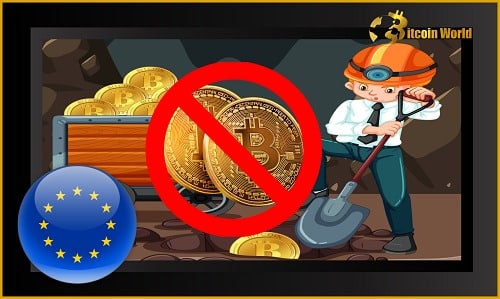Is Europe about to pull the plug on energy-guzzling crypto mining? The buzz in the crypto sphere is all about a recent statement from a top European securities regulator suggesting a potential ban on Proof-of-Work (PoW) crypto mining within the European Union. Let’s dive into what’s happening and what it could mean for the crypto market and you, the crypto trader.
Why is the EU Considering a Crypto Mining Ban?
Erik Thedéen, the vice-chair of the European Securities and Markets Authority (ESMA), recently voiced concerns about the environmental impact of crypto mining, particularly the Proof-of-Work mechanism used by Bitcoin and other cryptocurrencies like Litecoin. He argues that Bitcoin mining has become a “national concern” due to its significant energy consumption and the associated climate change risks.
Thedéen isn’t just raising concerns; he’s urging European authorities to actively consider banning Proof-of-Work mining. His goal? To push the crypto industry towards more energy-efficient alternatives, primarily Proof-of-Stake (PoS). This move echoes China’s ban on crypto mining in May 2021, which dramatically shifted the global mining landscape.
Key Concerns Highlighted by Thedéen:
- Environmental Impact: PoW mining requires substantial computational power, translating to massive energy consumption, often from non-renewable sources.
- Climate Change Risks: The energy intensity of PoW mining contributes to carbon emissions and exacerbates climate change.
- National Concern: The energy demand from crypto mining can strain national energy grids and potentially hinder climate goals.
Proof-of-Work vs. Proof-of-Stake: What’s the Difference?
To understand the debate, it’s crucial to grasp the difference between Proof-of-Work and Proof-of-Stake:
| Feature | Proof-of-Work (PoW) | Proof-of-Stake (PoS) |
|---|---|---|
| Energy Consumption | High – Requires significant computational power | Low – Relies on staked cryptocurrency |
| Mining/Validation Process | Miners solve complex mathematical puzzles to validate transactions and create new blocks. | Validators are chosen based on the amount of cryptocurrency they stake to validate transactions and create new blocks. |
| Security | Considered secure due to the computational effort required for attacks. | Becoming increasingly secure as PoS networks mature; security relies on the value staked. |
| Examples | Bitcoin, Litecoin, Ethereum (currently transitioning) | Ethereum (post-merge), Cardano, Solana |
The core argument for banning PoW is its energy inefficiency compared to PoS. Switching to PoS could drastically reduce the environmental footprint of cryptocurrency networks.
China’s Ban: A Precedent and an Unexpected Outcome?
Thedéen’s call for a ban is directly compared to China’s crypto mining crackdown in May 2021. China’s ban forced mining operations to relocate, and interestingly, this had some unexpected positive consequences.
According to a Bitcoin Mining Council report for Q3 2021, China’s ban inadvertently led to an increase in the use of renewable energy in Bitcoin mining. Renewable energy sources powered an estimated 58% of Bitcoin’s network in that quarter. This suggests that relocating mining operations might push them towards regions with more sustainable energy sources.
Industry Pushback: Is a Crypto Mining Ban “Misinformed”?
Not everyone agrees with Thedéen’s perspective. Melanion Capital, a Paris-based investment firm, strongly criticized the idea of a crypto mining ban, calling it “completely misinformed.” They argue that banning PoW mining might not be the most effective solution and could stifle innovation within the crypto space.
Arguments Against a Crypto Mining Ban:
- Innovation Stifling: A ban could hinder the growth and development of the cryptocurrency industry in Europe.
- Geographical Shift, Not Reduction: Banning mining in one region might simply move it to another, potentially with less stringent environmental regulations or less access to renewable energy.
- Focus on Renewable Energy: Instead of bans, the focus should be on incentivizing the use of renewable energy sources for crypto mining, as evidenced by the Bitcoin Mining Council report.
- Potential for Technological Advancements: Technological advancements in mining hardware and software could lead to greater energy efficiency in PoW mining over time.
What Does This Mean for Crypto Traders and the Market?
The potential EU ban on PoW mining is a significant development that could have several implications:
Potential Impacts:
- Market Volatility: News of a potential ban could create uncertainty and volatility in the crypto market, particularly for PoW cryptocurrencies like Bitcoin and Litecoin.
- Shift to Proof-of-Stake: Increased pressure on PoW might accelerate the shift towards Proof-of-Stake and other more energy-efficient consensus mechanisms.
- Mining Landscape Changes: European crypto mining operations could face significant challenges, potentially leading to relocation or closure.
- Regulatory Scrutiny: This move signals increasing regulatory scrutiny on the environmental impact of cryptocurrencies globally.
- Investment in Green Crypto: Growing interest and investment in environmentally friendly cryptocurrencies and sustainable crypto practices.
The Road Ahead: Will the EU Ban Crypto Mining?
It’s still early days, and Thedéen’s comments are a call for consideration, not an official policy. However, it highlights a growing concern among regulators about the environmental footprint of crypto mining. Whether the EU will actually implement a ban remains to be seen. It will likely depend on further discussions, impact assessments, and potentially, alternative solutions proposed by the crypto industry itself.
For now, crypto traders and enthusiasts should keep a close eye on developments in European crypto regulation. The debate around PoW mining and its environmental impact is far from over and will continue to shape the future of the cryptocurrency landscape.
Related Reads:
– Ex-SEC Chair, Jay Clayton Believes Cryptocurrency Industry Is For Long Haul
– A Digital European Project In Works With Italian Payments Provider Nexi
Disclaimer: The information provided is not trading advice, Bitcoinworld.co.in holds no liability for any investments made based on the information provided on this page. We strongly recommend independent research and/or consultation with a qualified professional before making any investment decisions.




